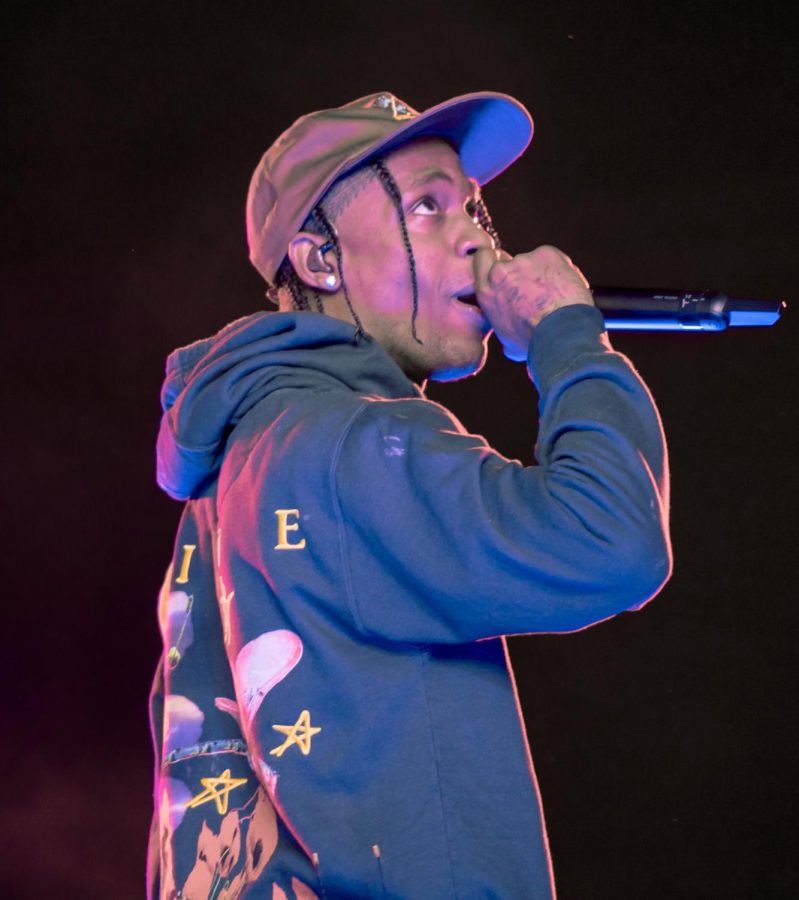Students react to Astroworld Festival tragedy
Ten people died at Travis Scott’s Astroworld Festival in Houston Nov. 7. Frank Schwichtenberg via Wikimedia Commons, licensed BY-SA 4.0.
November 18, 2021
Travis Scott’s Astroworld Festival attracted hundreds of thousands of concertgoers eager to attend after it was cancelled for the past two years. Fans, all clamoring to see Travis Scott himself, could never have expected what happened: barriers being trampled, sinkholes of people in the crowd, people passing out with no way to get help. Ultimately, 10 people have been confirmed dead and hundreds more injured.
Something was off right from the beginning — teenagers without tickets were rushing the venue gates and stampeding through broken-down barriers, and security guards were very clearly unprepared, understaffed and unable to control the chaos.
As people waited for hours before the stage where Scott would perform, the crowd quickly grew rowdier as people pushed their way closer to the barriers. As Scott finally made his way onto the stage, seconds into his first song, people began storming through the crowd.
Seanna Faith McCarty, a concert attendee, posted Nov. 6 about her traumatizing experience on Instagram, detailing how people were drowning in the crowd.
“Breathing became something only a few were capable of,” McCarty said. “… People began to choke one another as the mass swayed. It became more and more violent. We began to scream for help.”
According to McCarty’s testimony, the crowd became more and more compressed, people began falling into sinkholes, unable to come back up. Medics had no time to help everyone, people were collapsing and being trampled as the compression worsened. Some concertgoers stood on top of ambulances, preventing people from getting the care they needed. There weren’t enough supplies, enough medics, enough ways out of the crowd.
“From what I’ve seen medics [saying] about the situation and testimonies from audience members who were there, it seems criminally negligent,” said Frida Basame, a third-year combined mechanical engineering and design major. “I’ve seen videos of people reaching up to tell a cameraman that someone is dead on the ground, asking for help, and they were brushed off every time.”
People begged Travis Scott to stop the show. He paused temporarily, noticing an emergency vehicle, and watched fans in the audience being carried out, completely unconscious. Ultimately, he told the crowd, “You know what you came here to do,” and continued his set.
“I’m not particularly surprised because Travis Scott has always been known for ‘ragers’ and encouraging risky activities,” said Elaine Rim, a fifth-year business administration and psychology combined major. “He does things that really reflect a culture of toxic masculinity, being like, ‘Yo, let’s f–king rage,’ and not caring about how dangerous it actually is. … He definitely saw people crying for help and didn’t do anything.”
Travis Scott has a pattern of emboldening fans to participate in dangerous behavior. In 2017, he encouraged a fan to jump off a balcony into the crowd below, and the fan ended up breaking his legs. In 2015, Scott stopped his show after a fan attempted to steal his shoe. Footage shows him spitting on the fan and telling the surrounding audience members to “f–k him up.”
The blame for the tragedy has been shifted around, but most people agree that Travis Scott is at least partially at fault.
“It seems like it’s sort of everybody’s fault,” said Luke Adams, a third-year business administration major. “It’s such an intense oversight. [Crowd security] should have noticed; they should have been watching and should have been able to stop it when they heard people died.”
Rim, who has seen Scott live twice, felt that both Scott and the organizers of the Astroworld Festival did not do well to prepare for any form of emergency.
“I definitely do think Travis is up to blame; it was not the crowd’s fault,” she said. “And then I also think that it goes beyond Travis because it’s also on the organizers of the festival. … I went to Boston Calling in 2019 where Travis headlined, and it was organized way better than his own festival.”
Scott’s apology was received with much criticism. Immediately following his set, he attended an afterparty. This has led fans to feel as though Scott, who watched the situation from on stage, abandoned them, but Scott claims he was not aware of the severity of the situation. Once he did put out his apology, many felt it was insincere and that he needed to take more accountability and accept his role in what happened.
Scott’s post on Instagram read, “I am committed to working together with the Houston community to heal and support the families in need,” and expressed his devastation over the events of the Astroworld Festival. People on social media were wholly unsatisfied with his apology, believing it to be a crafted message from a PR team.
“Every time someone in the public eye is going to try to make amends, it’s never going to be enough for everyone,” said Adams. “In this case, I do think Travis probably could have done a better job of addressing it. He is paying for the funerals of all the victims, which is the right thing to do. I just think that next time he performs, this should be a fantastic lesson in how not to organize a concert.”
Basame thinks that Scott should take a break from performing while he works to make amends for the tragedy.
“He needs to do some serious reflection on what happened that night,” she said. “This is not the first time that his show has been dangerous for his fans. Those other times, he got lucky that no one died at his show. But this time he wasn’t and nine people are dead. He created conditions for people to get seriously hurt.”


















